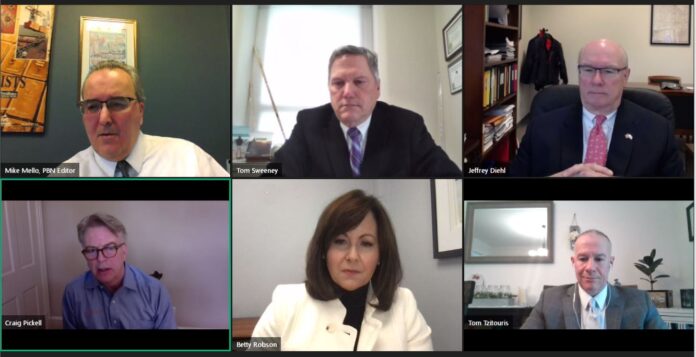
PROVIDENCE – Like any good business owner, Craig Pickell documents every cost increase incurred by his Lincoln manufacturing company, Bullard Abrasives Inc.
But the year-end tally, which used to total a few pages, has now swelled to a 1-inch-thick report thanks to constant price hikes in materials, wages and utilities. And Pickell isn’t optimistic that relief is on the way.
“We just don’t see it abating the way we thought it would,” Pickell said. “We’re gravely concerned about what the future has in store because we just don’t see it letting up.”
Pickell, who spoke during the Providence Business News’ Economic Trends Summit held virtually on Thursday morning, was not the only one painting a bleak picture for the year ahead. Other panelists agreed that the triple whammy of inflation, supply chain bottlenecks and worker shortages is unlikely to abate.
Global logistics company J.F. Moran Co. Inc. has been hamstrung by a shortage of truck drivers needed to get goods to their final destinations, said CEO Elizabeth “Betty” Robson. Meanwhile, the red-hot real estate market can’t sustain record activity much longer amid a lack of housing as well as the large industrial space needed to lure big-name companies to the state, according to Thomas Sweeney, owner of Sweeney Real Estate and Appraisal.
It’s a dumpster fire that business leaders are struggling to put out. But Thomas Tzitzouris, head of fixed income research for Strategas Research Partners, saw the writing on the wall. Tzitzouris, who was the featured keynote speaker Thursday, warned of rising inflation in his address during PBN’s 2021 economic summit a year ago.
The historically low interest rates that characterized much of the last two years, combined with federal stimulus for businesses and consumers, was the perfect recipe to create what is now a 40-year-high in inflation, Tzitzouris said.
“It’s the 800-pound gorilla,” Tzitzouris said of inflation.
Strategas predicts core inflation – which does not reflect the cost of food and energy – will fall from its current 4.5% to 2.6% by the fourth quarter. But remnants will linger through the end of the decade, Tzitzouris said.
Even aggressive action by the Federal Reserve can’t completely wipe out this “sticky inflation,” Tzitzouris said, because the sources – labor, material and housing shortages – will continue.
Tzitzouris predicted Rhode Island will stay true to its traditional “first in, last out” recessionary recovery path, plagued by a “structurally impaired economy,” with lower wages, higher home prices and a surge in delinquent borrowers unable to make payments on their adjustable-rate loans as interest rates climb.
But with catastrophe comes opportunity, too, especially if the Ocean State can capitalize on its ports and industrial core to become a hub for cargo and other goods, Robson said.
“If we can move goods from the airport to [the port at] Quonset in an efficient manner, that will allow us to become a leader in this area,” she said.
Already, investments in the ports of Providence and Davisville at Quonset Point in North Kingstown are positioning the state to take a starring role in national reshoring efforts as well as the burgeoning offshore wind industry.
But prioritizing the physical infrastructure needed to continue down this path is crucial, and must be a focus as the state forges ahead with doling out the billions in federal aid through the American Rescue Plan Act and U.S. Infrastructure and Jobs Act, said panelist Jeffrey Diehl, executive director and CEO for the Rhode Island Infrastructure Bank.
Rhode Island is “almost a year behind” other states in spending its federal stimulus aid, Diehl said, and while urgency is needed, strategy must not be sacrificed for the sake of speed.
Balancing competing interests and needs will not be easy. While panelists agreed affordable housing and infrastructure are worthy state priorities, they didn’t see eye to eye on how best to help small businesses. Pickell was critical of Gov. Daniel J. McKee’s initial allocation of American Rescue Plan Act money for small businesses, saying more was needed.
Whether R.I. Commerce Corp. should be focused on supporting existing, local business owners versus luring in big-name companies was also a topic of debate. Pickell lauded R.I. Commerce Secretary Stefan Pryor for his efforts, suggesting a bronze statue should be erected in his honor. Sweeney took a more moderate approach, stressing the need to balance focus on big and small businesses, while Tzitzouris cautioned against “crony capitalism” of “sweetheart deals” for big, out-of-state corporations at the expense of small, local businesses.
“There has been just too much focus over the last 30 years on attracting new businesses,” he said. “There needs to be more done to encourage and level the playing field, reduce the barriers to entry.”
Addressing the labor crisis also topped the list of panelists’ recommendations, particularly with education and workforce training programs that prepare a new generation of employees.
“We are really losing out big-time here in the state,” Pickell said. ‘We have a lot of people entering the school system who are not prepared to enter the workforce.”
Nancy Lavin is a staff writer for the PBN. Contact her at Lavin@PBN.com.












